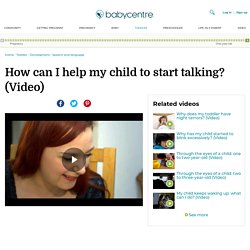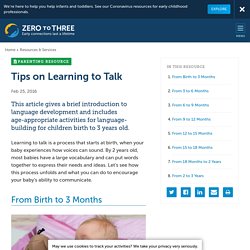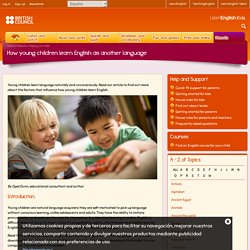

Multilingual Preschoolers. It’s amazing how young children learn to converse with others. They have to not only internalize grammar and vocabulary, but also develop an understanding of culture: how to take turns in a conversation, who to talk to, and how to narrate a story. For dual language learners (DLLs) — children under the age of 5 with a home language other than English — that process can be complex. These young children must constantly navigate between two languages and cultures, while learning the rules of both. And while the benefits of multilingualism are clear, these learners they may be excluded or teased because of their differences, which can hinder their development. As linguistic diversity skyrockets worldwide, early childhood educators need to be prepared to help DLL students meet and overcome these unique challenges. The Diversity of Languages in Early Education.
How can I help my child to start talking? (Video) Health visitor Sara Patience describes how you can help develop your child's language skills by talking and playing with her.

Show transcript. A big, warm BabyCentre welcome. Let's Talk. What do babies need in order to learn and thrive? One thing they need is conversation — responsive, back-and-forth communication with their parents and caregivers. This interactive engagement is like food for their developing brains, nurturing language acquisition, early literacy, school readiness, and social and emotional well-being. A dispiriting number of children don’t get that kind of brain-fueling communication, research suggests.
In early childhood policy (and in the wider media), much attention has been paid to the so-called word gap — findings that show that low-income children hear 30 million fewer words, on average, and have less than half the vocabulary of upper-income peers by age three. Deb Roy: The birth of a word. FAQ: Raising Bilingual Children. Why want bilingual children? There are many reasons, but the two most common are: 1) The parents speak different languages (say, an American woman and a Turkish man). 2) The parents speak the same language, but live in a community where most people speak something else (say, a Korean couple living in the USA). In the first case, both the mother and father may want to be able to use their own language when talking to their children. This is the bilingual home situation.
Don't children get confused when they hear two languages spoken around them? The short answer is no. Fifty years ago educators throughout North America used to tell immigrant parents that it was better for their children's schooling if they spoke English at home. Being Multilingual: You speak with an accent. I don’t. Accents are things that only other people have.
They are, by extension, things that you don’t want to have. Accents are, in short, shortcomings. This is why, if someone tells you that “you speak with no accent”, you can be sure of two things: that you have received words of praise indeed; and that you speak with the same accent as that person. So the person is actually not only praising her own accent, she is also giving evidence that she has no idea she’s got one. How baby brains develop. The Woman Who Changed Her Brain: Barbara Arrowsmith-Young at TEDxToronto. The Power of Evening Routines.
The word “structure” can evoke less than positive associations. It suggests constraints, which are never a good thing, right? Wrong. It turns out that everyone benefits from a certain amount of daily structure, so long as that structure is pleasant, productive, and meaningful. Whether it’s the most inventive minds in history, or those people who live in good health past 100, a daily routine or set of micro-routines is correlated with productivity, health, and longevity. As beneficial as routines are for artists and centenarians, they are even more essential for children. Not surprisingly, children from unstructured homes often struggle in school. In order to support families of school-aged children, I surveyed best practices in child development and operationalized them in a two-hour school night routine, which I call “prime-time parenting” (which is also the title of my recent book). 6:30 p.m. – The Dinner Half-Hour: Enjoy a nutritious dinner as a family.
How do you speak 'Motherese'? News BBC News Navigation Sections Previous Next Media player. Does being bilingual make you smarter? Language teacher and researcher Miguel Angel Muñoz explains the latest research on how being bilingual affects your brain, ahead of a British Council seminar in Cardiff on whether learning a foreign language makes you smarter. You can watch the live-streamed seminar on Tuesday, 3 June. More than half the world's population uses two or more languages every day It is hard to estimate the exact number of bilingual people in the world, as there is a lack of reliable statistics .
But in 2012, a Eurobarometer survey established that 'just over half of Europeans (54%)' are bilingual, and other studies hypothesise that more than half of the world’s population is bilingual. Tips on Learning to Talk. Learning to talk is a process that starts at birth, when your baby experiences how voices can sound.

By 2 years old, most babies have a large vocabulary and can put words together to express their needs and ideas. Let’s see how this process unfolds and what you can do to encourage your baby’s ability to communicate. From Birth to 3 Months Your baby listens to your voice. A few more myths about speakers of multiple languages.
Does multilingualism cause language delays and identity problems? The British Council's Nayr Ibrahim busts a few more myths about speakers of multiple languages. Myth: Multilingualism causes language delay Raising children bilingually is sometimes believed to cause language delay. This misconception is based on a separate underlying proficiency (SUP) hypothesis. This theory, now discredited, suggests that languages are stored in separate compartments or containers, which represent half the capacity of the monolingual brain. KQED Public Media for Northern CA. Patricia Kuhl: The linguistic genius of babies. Alison Gopnik: What do babies think? How young children learn English as another language. By Opal Dunn, educational consultant and author Introduction Young children are natural language acquirers; they are self-motivated to pick up language without conscious learning, unlike adolescents and adults.

They have the ability to imitate pronunciation and work out the rules for themselves. Any idea that learning to talk in English is difficult does not occur to them unless it’s suggested by adults, who themselves probably learned English academically at a later age through grammar-based text books.